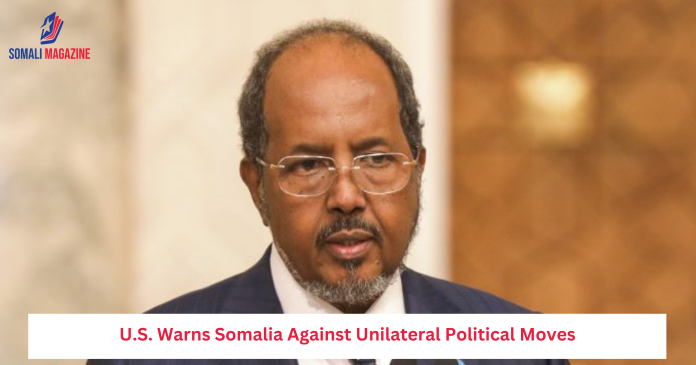Facebook Twitter (X) Instagram Somali Magazine - People's Magazine
Washington urges inclusive dialogue after key federal states were sidelined in a major national summit, raising concerns over legitimacy and national unity
The United States has raised concerns about recent political decisions by Somali leaders during a National Consultative Council (NCC) meeting held in Mogadishu. The U.S. warned that any attempts to change the country’s governance or election systems without involving all key stakeholders could create more problems for Somalia.
In a statement posted on X (formerly known as Twitter), the U.S. Department of State’s Bureau of African Affairs emphasized the importance of including everyone in Somalia’s political discussions. According to the post, decisions about the country’s federal system and election process must involve a wide range of voices to be seen as legitimate.
“All relevant stakeholders should have a say in changes to Somalia’s federal and election systems. Decisions taken without broad-based support will lack legitimacy and distract from pressing security challenges,” the U.S. statement said.
This warning came after a three-day NCC summit concluded on Wednesday in Mogadishu. The meeting was led by President Hassan Sheikh Mohamud and included Prime Minister Hamza Abdi Barre, Deputy Prime Minister Salah Ahmed Jama, and leaders from several federal member states: Galmudug, Hirshabelle, South West, SSC-Khaatumo, and Banadir.
However, two important federal member states—Puntland and Jubbaland—did not attend the meeting. Their leaders have been in ongoing disagreements with the federal government and have pulled out of the consultative process. Their absence has raised serious concerns both within Somalia and among international partners.
During the summit, leaders expressed strong support for the Somali National Army in its fight against the terrorist group Al-Shabaab. They also called for closer cooperation between the central government and regional states to improve security and governance. But the lack of participation from Puntland and Jubbaland has made some observers question the legitimacy of the summit’s outcomes.
Many critics believe the federal government is trying to take more control without properly consulting all regions. They argue that the government is pushing ahead with changes to the election process and federal structure without reaching a consensus, which could lead to even more division in a country already facing serious challenges.
The National Consultative Council is meant to bring together leaders from Somalia’s federal and state governments to discuss major national issues, such as security, governance, and political reforms. It plays a key role in guiding Somalia’s path forward.
But when some regions are excluded or choose not to take part, the decisions made at such meetings can be seen as one-sided. That’s why international partners like the United States, the United Nations, and the African Union continue to encourage Somali leaders to resolve their differences through dialogue and agreement.
The U.S. and other international actors have made it clear that Somalia’s fragile federal system needs unity and cooperation to succeed. Without inclusive political discussions, the country risks sliding further into political instability, which would only make it harder to fight terrorism and strengthen democratic institutions.
The U.S. warning serves as a reminder to Somali leaders that national progress can’t be made through unilateral decisions. Instead, it must come from working together with all parts of the country, ensuring that everyone has a voice in shaping the future.

